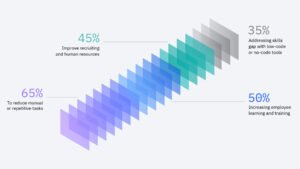The 12th Statistical Forum of the International Monetary Fund (IMF), scheduled for November 20-21, 2024, in Washington, D.C., promises to be a landmark event. Focused on “Measuring the Implications of AI on the Economy,” this year’s forum comes at a pivotal time when AI adoption is transforming industries, workforce dynamics, and economic frameworks. After reviewing the agenda and details, I believe this forum reflects the IMF’s proactive approach to understanding AI’s economic impact, and its discussions will likely set the foundation for new policies and regulatory frameworks in the coming years.
Key Themes: Where AI is Headed and Its Economic Impact
This year’s forum focuses on some critical themes:
- AI’s Transformative Potential: Identifying sectors where AI will have the greatest short- and medium-term impact.
- Jobs and Productivity: Exploring how AI affects the labor market, raising productivity but also posing risks of job displacement.
- Distributional Implications: Understanding who benefits from AI’s economic output and where the income flows.
- AI Regulation and Measurement: Addressing how governments can regulate AI effectively and how statisticians can measure AI’s economic value.
The IMF aims to bridge knowledge gaps by gathering researchers, policymakers, and the private sector to explore these pressing questions.
Opening Address: Balancing AI’s Rewards and Risks
The forum kicks off with a powerful opening address by Susan Carleton Athey, Professor at Stanford University’s Graduate School of Business, in conversation with Bo Li, IMF’s Deputy Managing Director. The address promises to shed light on how organizations are adopting AI, the opportunities it presents, and the risks it brings, such as data privacy, bias, and ethical concerns.
The message is clear: while AI can be a game-changer, the operational and strategic landscapes it reshapes must be navigated with caution.

Future Horizons: The Greatest Impact of AI in Coming Years
A dedicated session titled “Exploring the Horizon” will delve into sectors that will witness the most profound AI-driven changes. Speakers will share insights into regional economic shifts and AI-driven innovation:
- Marek Rozkrut from EY Poland discusses the macroeconomic consequences of generative AI.
- Marina Tavares from the IMF Research Department examines AI’s impact on jobs.
- Thomas Melonio from Agence Française de Développement highlights how AI investment can spur sustainable development.
- Filippo Natoli from the Bank of Italy explores the macroeconomic effects of AI innovation.
From automation in industries to AI investment trends, these discussions will offer insights on where AI’s impact will be felt most acutely.
AI’s Impact on Jobs and Productivity: A Mixed Bag
The session titled “Shaping the Future” focuses on AI’s implications on jobs and productivity. While AI tools can boost efficiency and drive economic growth, they also raise concerns about displacing workers in both blue- and white-collar jobs. Some of the speakers include:
- Iñaki Aldasoro from the Bank of International Settlements, addressing AI’s impact on output and inflation.
- Chen Zhihan from Singapore’s Ministry of Manpower, discussing AI’s role in enhancing data quality in government statistical processes.
- Alex Copestake from the IMF explores AI’s potential in services-led growth by studying Indian job adverts.
- Janine Berg from the International Labor Organization provides a global analysis on how generative AI might affect job quantity and quality.
This session will provide a global perspective on AI’s dual nature—as both an enabler of growth and a disruptor of labor markets.
AI for All? The Uneven Adoption of Technology
While advanced economies are rapidly embracing AI, many countries struggle to keep up. The “AI for All” panel discussion will explore:
- Transition costs for countries unable to keep pace with AI adoption.
- Policies and strategies to guide responsible AI implementation.
- The need for robust data frameworks to track AI’s economic and societal impact.
This discussion raises a critical question: How can countries without access to cutting-edge AI technology avoid falling behind?
Power Dynamics: Who Controls the Future of AI?
One of the most crucial sessions, “Power Dynamics in AI,” will explore the concentration of AI expertise and income among a handful of powerful firms.
- Joshua Gans from the University of Toronto will address the implications of market power in AI.
- Silvia Arini from Indonesia’s statistics agency will explore the differences between digital footprints and survey data when measuring AI’s impact on firms.
- Ibrahim Abada from Essec Business School will present research on whether sophisticated algorithms drive monopolistic profits through unintended collusion.
As AI models become increasingly complex and expensive to develop, income flows will likely concentrate among a few firms, raising significant distributional concerns.
Regulation and Measurement: Paving the Way for Responsible AI
Sessions on innovation and regulation will explore how AI is being integrated into firm operations and government policies. Experts will share their findings on:
- Regulatory frameworks to ensure AI’s responsible use.
- Early efforts to quantify AI investments and industry size.
- The development of Responsible AI Readiness Indexes to track a country’s preparedness for AI-driven growth.
These discussions underscore the urgency of designing regulations that strike the right balance between innovation and accountability.
My Take: AI Will Redefine the Global Economy, but We Must Prepare for the Consequences
The IMF’s 12th Statistical Forum captures a defining moment in history: the transition from human-led economies to AI-driven economies. Based on my analysis, the forum provides early indicators of both opportunities and risks:
- AI will amplify productivity, but job displacement will create significant challenges, especially in developing economies.
- Income inequality may deepen as a few firms gain control over the most advanced AI systems.
- Regulations will be critical—governments must act quickly to mitigate the risks while promoting innovation.
Personally, I believe that AI adoption must be inclusive. Countries with limited resources to develop AI technology should collaborate globally to avoid being left behind. With smart policies and data-driven strategies, AI can enhance global prosperity—but only if its benefits are shared equitably.
Conclusion: A Forum with Global Implications
The IMF’s 12th Statistical Forum offers a rare opportunity to bring together global leaders in economics, statistics, and AI to address the transformative impact of AI. The insights shared here will likely shape policy frameworks for years to come, laying the groundwork for a more inclusive, AI-powered economy.











